
Peasmarsh Festival 2021
2021 Guest Artists
Katya Apekisheva, piano
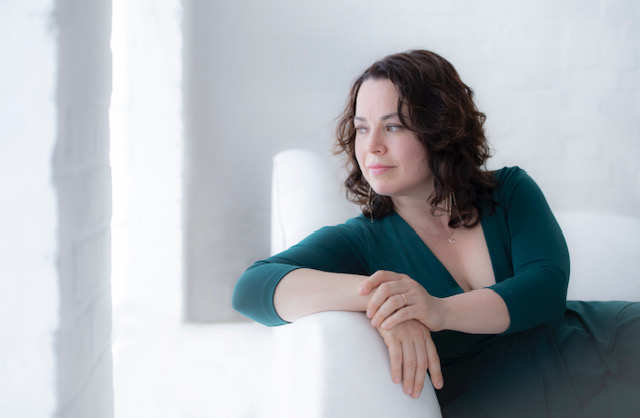 Born in Moscow, into a family of musicians, she attended the Gnessin Music School for exceptionally gifted children making her stage debut at the age of 12. She continued her studies in Jerusalem at the Rubin Music Academy and later at the Royal College of Music in London. From these auspicious beginnings she went on to be a Prizewinner of the Leeds International Piano competition and has gone on to enjoy a career performing with many of the world’s leading orchestras, including the London Philharmonic Orchestra, the Philharmonia Orchestra, the Halle Orchestra, the Moscow Philharmonic, the Jerusalem Symphony, the English Chamber Orchestra and the Royal Philharmonic Orchestra, working with renowned conductors such as Sir Simon Rattle, David Shallon, Jan Latham-Koenig and Alexander Lazarev.
Born in Moscow, into a family of musicians, she attended the Gnessin Music School for exceptionally gifted children making her stage debut at the age of 12. She continued her studies in Jerusalem at the Rubin Music Academy and later at the Royal College of Music in London. From these auspicious beginnings she went on to be a Prizewinner of the Leeds International Piano competition and has gone on to enjoy a career performing with many of the world’s leading orchestras, including the London Philharmonic Orchestra, the Philharmonia Orchestra, the Halle Orchestra, the Moscow Philharmonic, the Jerusalem Symphony, the English Chamber Orchestra and the Royal Philharmonic Orchestra, working with renowned conductors such as Sir Simon Rattle, David Shallon, Jan Latham-Koenig and Alexander Lazarev.
As a recording artist, Katya has received widespread critical acclaim for her interpretations from Gramophone Magazine’s Editor’s Choice award and International Piano Magazine’s Critics’ choice to Classic FM’s CD of the week as well as a Classical Brit award to name but a few. Katya’s discography includes solo and chamber works by Mussorgsky, Shostakovich, Stravinsky, Dvorak and Rachmaninov.
Recent and future highlights include performances in Russia, Norway, Japan, Switzerland, Italy, Denmark, Germany, Australia and at home in the UK at the Bath Mozart Fest, St. George’s Bristol and the prestigious Wigmore Hall – where she is a regular presence.
Her intense artistry and delicacy makes Katya a most sought after collaborative pianist, working with artists such as Janine Jansen, Natalie Clein, Guy Johnston, Maxim Rysanov, Jack Liebeck, Boris Brovtsyn, Alexei Ogrinchouk and Nicholas Daniel and she appears regularly at major chamber music festivals around the world. Katya also has a highly successful and personally rewarding piano duo partnership with Charles Owen, performing regularly at festivals worldwide. Together they are co-Artistic Directors of the London Piano Festival which began in 2016.
 Sascha Bota, viola
Sascha Bota, viola
Alec Frank-Gemmill, horn
Alec Frank-Gemmill was a member of the BBC Radio 3 New Generation Artist scheme from 2014–16, often appearing as a soloist with the BBC orchestras, including in performances of rarely-heard repertoire by Ethel Smyth, Malcolm Arnold and Charles Koechlin. He was Principal horn of the Scottish Chamber Orchestra for ten years and took up the same position with the Gothenburg Symphony Orchestra in October 2019.
With the Scottish Chamber Orchestra, Alec performed concertos by Mozart (on the natural horn), Ligeti, Strauss and Schumann. His recording of Strauss’s First Concerto was recently named Disc of the Week on the BBC’s Record Review programme. He has also recorded three albums for the BIS label, thanks to the support of the Borletti–Buitoni Trust. He is very active in the early music scene and has been a member of Peter Whelan’s Ensemble Marsyas since its inception. Whether on modern, classical or baroque horn, he is highly in demand as a chamber music partner and appears regularly at the Wigmore Hall.
Graham Mitchell, double bass
Barbican String Quartet
Navarra String Quartet
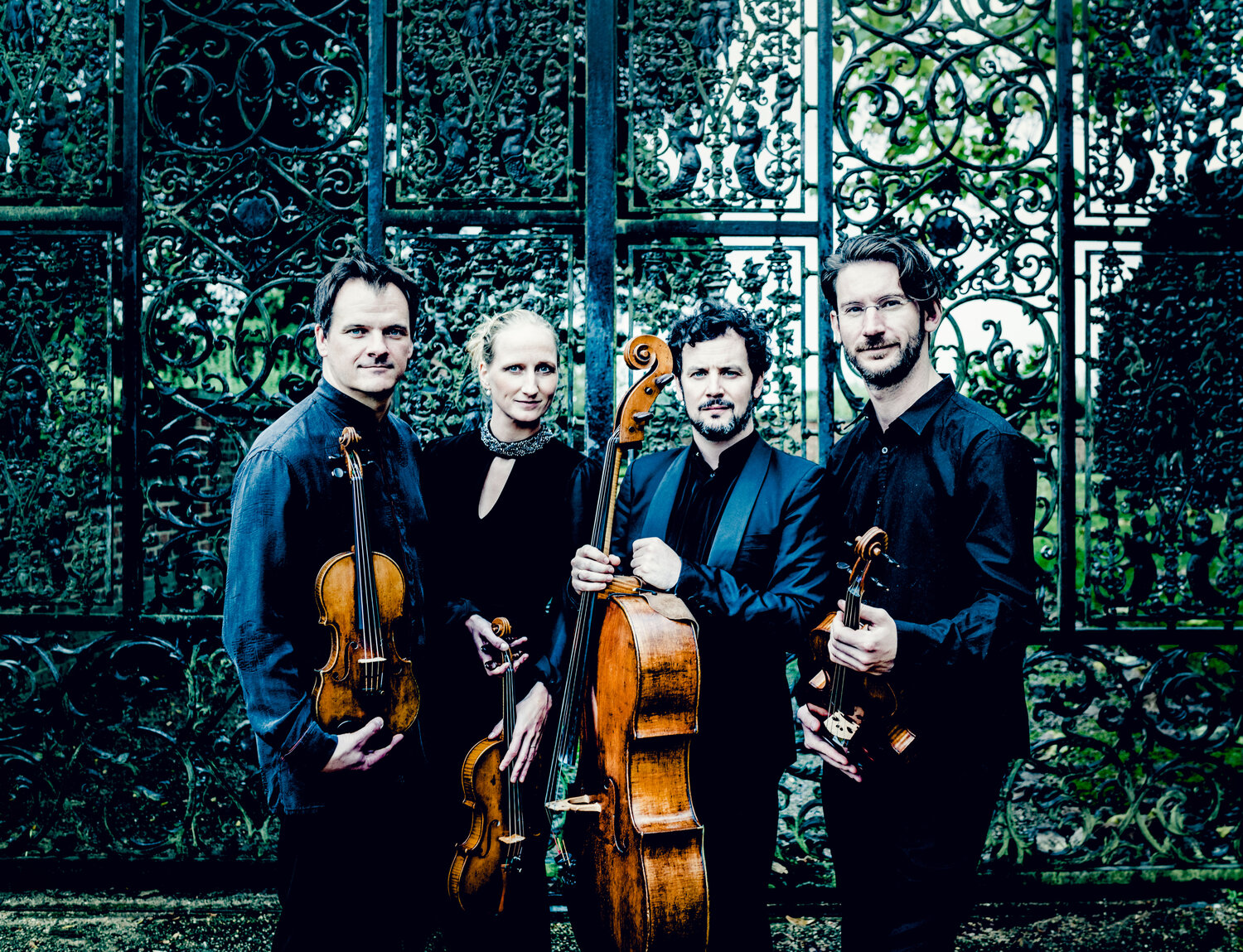 The Navarra Quartet have built an international reputation as one of the most dynamic and poetic string quartets of today. Selected for representation by the Young Classical Artists Trust (YCAT) in 2006, they went on to win the MIDEM Classique Young Artist Award, a Borletti- Buitoni Trust Fellowship and top prizes at the Banff, Melbourne and Florence International String Quartet Competitions. In 2017, they were awarded the prestigious Kersjes Prize in the Netherlands.
The Navarra Quartet have built an international reputation as one of the most dynamic and poetic string quartets of today. Selected for representation by the Young Classical Artists Trust (YCAT) in 2006, they went on to win the MIDEM Classique Young Artist Award, a Borletti- Buitoni Trust Fellowship and top prizes at the Banff, Melbourne and Florence International String Quartet Competitions. In 2017, they were awarded the prestigious Kersjes Prize in the Netherlands.
The Navarra Quartet has appeared at major venues throughout the world including the Wigmore Hall, Amsterdam Concertgebouw, Luxembourg Philharmonie, Berlin Konzerthaus, Sydney Opera House and international festivals such as Bath, Grachten, Sandviken, Schwetzinger, Rheingau, Mecklenburg- Vorpommern, Huntingdon (Australia), Aix- en-Provence, Bellerive and the BBC Proms. Further afield they have given concerts in Russia, the USA, China, Korea and the Middle East. The Quartet has collaborated with artists such as Li-Wei, Guy Johnston, Mark Padmore, Allan Clayton, Francesco Piemontesi, John O’Conor, Simone Young and the National Youth Orchestra of Great Britain.
Highly-acclaimed recordings include Haydn’s The Seven Last Words for Altara Records and a disc of Pēteris Vasks’ first three String Quartets for Challenge Records, which they recorded whilst working closely with the composer himself. The recording was described by critics as “stunning”, “sensational” and “compelling”, and was nominated for the prestigious German Schallplattenkritik Award. More recently, the Navarra Quartet recorded a disc for NMC Records featuring the music of Joseph Phibbs. Their new CD ‘Love and Death’ will be released in spring 2020.
Formed at the Royal Northern College of Music, they commenced their studies under the guidance of the late Dr. Christopher Rowland. Their development continued with studies in Cologne with the Alban Berg Quartet, Pro- Quartet in Paris, the International Musicians Seminar at Prussia Cove and from residencies at the Britten-Pears School in Aldeburgh and at the Verbier Festival in Switzerland. A constant desire to evolve sees the quartet play regularly to revered musicians such as Rainer Schmidt, Eberhard Feltz, Ferenc Rados and Gabor Takacs Nagy. They also enjoy teaching the next generation in masterclass and summer courses. They were quartet in residence at the Royal Northern College of Music and Associated Ensemble at the Birmingham Conservatoire.
The Quartet plays on a variety of fine instruments which include a Hieronymus II Amati and F. Cuypers generously on loan from the Nationaal Muziekinstrumenten Fonds in the Netherlands, an unknown, old English viola and a Grancino cello made in Milan in 1698, generously on loan from the Cruft – Grancino Trust which is administered by the Royal Society of Musicians.
Highlights this season and beyond include appearances at the Cesis Concert Hall in Latvia playing Peteris Vasks’ 3rd string quartet, Musica en Segura in Spain and Wigmore Hall.
The Navarra Quartet are excited to direct the 7th edition of the Weesp Chamber Music Festival in the picturesque town of Weesp, close to Amsterdam.
Sam Glazer, animateur
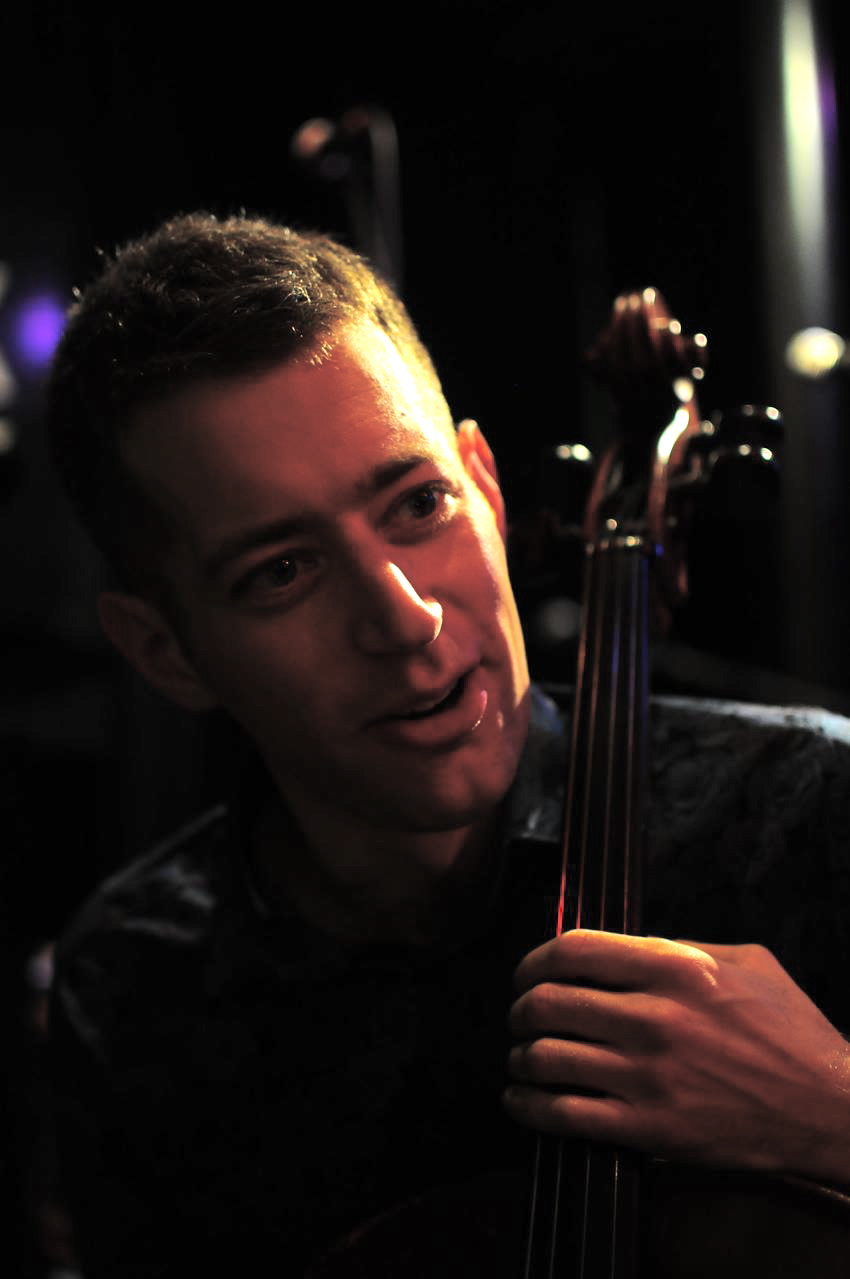 Sam Glazer is a composer, cellist and creative leader. He is co-creator of Spitalfields Music’s RPS-shortlisted Musical Rumpus, making operas for babies and toddlers, touring London, nationally and internationally (2012-2017). His choral score for circa’s Depart (LIFT/ Spitalfields Music/ Hull UK City of Culture 2017/ LeftCoast/ Brighton Festival) premiered in an East London Victorian woodland cemetery, and toured the UK in 2017. In 2018 he was commissioned by the Peasmarsh Chamber Music Festival to compose a new song cycle for children’s voices and string quartet, inspired by the commedia dell’arte. His latest commission, for Den Jyske Oper, was Hjerte Lyd, a new opera for babies and toddlers, which is touring Denmark in 2019.
Sam Glazer is a composer, cellist and creative leader. He is co-creator of Spitalfields Music’s RPS-shortlisted Musical Rumpus, making operas for babies and toddlers, touring London, nationally and internationally (2012-2017). His choral score for circa’s Depart (LIFT/ Spitalfields Music/ Hull UK City of Culture 2017/ LeftCoast/ Brighton Festival) premiered in an East London Victorian woodland cemetery, and toured the UK in 2017. In 2018 he was commissioned by the Peasmarsh Chamber Music Festival to compose a new song cycle for children’s voices and string quartet, inspired by the commedia dell’arte. His latest commission, for Den Jyske Oper, was Hjerte Lyd, a new opera for babies and toddlers, which is touring Denmark in 2019.
Sam has led projects for The Sixteen, the Royal Philharmonic Orchestra and Sinfonia Viva and developed creative learning programmes for the Peasmarsh Chamber Music Festival, the Winchester Chamber Music Festival and the Mid-Wales Music Trust. He has devised and presented schools concerts for the Britten Sinfonia, Sinfonia Cymru and the Royal Welsh College of Music and Drama. Sam has been involved for over ten years with Wigmore Hall’s pioneering Music for Life project, working in care homes with people with dementia, and subsequently went on to co-found Raise Your Voice Opera, Glyndebourne’s group for people with dementia and their carers living in the community. Since 2005 he has been teaching at the Royal Academy of Music, mentoring young musicians who are studying Music in the Community, and he is currently lead mentor for Spitalfields Music’s Trainee Music Leader programme. Sam plays and sings with the groundbreaking band Firefly Burning, who released their latest album Breathe Shallow in May 2019 with support from the PRSF and Snape Maltings.
 2021 Programme
2021 Programme
1A) WINCHELSEA FESTIVAL OPENING
Thursday 1 July, 7pm
Anthony Marwood, Richard Lester, Sascha Bota, Graham Mitchell, Sally Pendlebury, Barbican String Quartet
- JS Bach Cello Suite No. 3 in C major BWV 1009
- R Strauss Metamorphosen realised for string septet (by Rudolf Leopold)
- Mozart String Quartet No. 21 in D major, K.575
Composed whilst he was Kapellmeister in Köthen, Bach’s cello suites are among his most recognisable works; fiendishly demanding, they hold an iconic place in the Classical canon. Commissioned towards the end of WWII, Metamorphosen for 23 strings was originally conceived as a septet, as heard in this performance. Also a commission, in this case from the cello-playing Frederick William II, K.575 was the first of Mozart’s King of Prussia Quartets and, unsurprisingly, is full of delicious, prominent tunes for the cello.
Venue: St Thomas’ Church, Winchelsea
1B) PEASMARSH FESTIVAL OPENING
Thursday 1 July, 8.30pm
Anthony Marwood, Richard Lester, Sascha Bota, Alec Frank-Gemmill, Benjamin Gilmore, Tim Horton, Emily Nebel, Sally Pendlebury
- R Strauss Cello Sonata in F major, Op. 6, TrV 115
- Haydn String Quartet Op. 50 No. 5 ‘The Dream’
- Brahms Horn Trio in E flat major, Op. 40
Dedicated to, and premiered by, Hanuš Wihan (with whose wife Dora Strauss was in love, exchanging romantic letters over many years) Strauss’s Sonata – completed when the composer was 19 years old – was well received and quickly became a central part of the cello repertoire. Haydn’s Dream Quartet, one of the Prussian Quartets cheekily sold to publishers in both Austria and England, is followed by Brahms’ melancholic Horn Trio performed here, as the composer intended, on natural horn, despite the prominence of the valve horn by this point in the 19th Century.
Venue: Church of St Peter & St Paul, Peasmarsh
2) YOUNG COMPOSERS
We are very pleased to be able to go to five local primary schools this summer to offer composition workshops, led by Peasmarsh animateur Sam Glazer.
This year, instead of bringing all the young composers from different schools together, Sam (with musicians from the Peasmarsh Festival) will present a mini-concert in each school, so the young composers can perform their new works and hear some world-class chamber music.
Education work at the Peasmarsh Chamber Music Festival is generously funded by Rother District Council, High Weald Arts Society, Sussex Community Foundation, the Rudi Martinus van Dijk Foundation and Fairlight Arts Trust.
3) FRIDAY NIGHT IN RYE
Friday 2 July, 6pm (A) or 8.30pm (B)*
Anthony Marwood, Richard Lester (soloists) with an ensemble of Peasmarsh Virtuosi
- CPE Bach Cello Concerto in A minor, Wq.170
- Shostakovich Two Pieces for String Octet, Op. 11
- Raskatov Five Minutes from the Life of W.A.M
- Mozart Violin Concerto No. 3 in G major, K.216
- Ives The Unanswered Question
Exploiting the virtuosic capabilities of the cello, and epitomising CPE Bach’s influential move away from the Baroque and use of a more so-called empfindsamer, or ‘sensitive’ style, CPE Bach’s Cello Concerto is followed by Shostakovich’s Octet, composed alongside his first symphony when he was just 18 years old. Selected by Gramophone Magazine in 2019 as Mozart’s most popular of his violin concerti, his third is preceded by Raskatov’s humorous showpiece on themes by Wolfgang Amadeus, composed and dedicated to violinist Gidon Kremer in 2000. The concert ends with Ives’s remarkable and evocative work, The Unanswered Question, in which a solo trumpet repeatedly asks the ‘eternal question of existence’.
Venue: St Mary’s Church, Rye
4) SATURDAY MORNING CONCERT
Saturday 3 July, 11.30am
Sascha Bota, Benjamin Gilmore, Emily Nebel, Sally Pendlebury, Barbican String Quartet
- Britten String Quartet No. 2 in C major, Op. 36
- Suk Meditation on the Old Czech Hymn ‘St. Wenceslas’, Op. 35a
- Janáček String Quartet No. 1 ‘The Kreutzer Sonata’
This celebration of chamber music from the first half of the 20th Century begins with Britten’s atmospheric quartet, premiered at the Wigmore Hall in 1945 in a concert to mark the 250th anniversary of the death of Henry Purcell. Believing that WWI would result in freedom from the Austro-Hungarian empire, Suk wrote his Meditation to ‘strengthen the hope in the return of power to the hands of the Czech people, after the storms of wrath are over.’ The concert ends with Janáček renouncing the tyranny of men over women in his Kreutzer Sonata, based on Tolstoy’s novella of the same name.
Venue: Church of St Peter & St Paul, Peasmarsh
5) AFTERNOON CONCERT
Saturday 3 July, 3.30pm
Anthony Marwood, Richard Lester, Alec Frank-Gemmill, Tim Horton, Yoanna Prodanova, Christoph Slenczka, Amarins Wierdsma
- Mahler Piano Quartet in A minor
- Schubert String Trio Movement in B flat major D.471
- Abrahamsen 6 Pieces for Violin, Horn and Piano
- Schubert Impromptu in G flat major Op.90
Celebrating Vienna’s rich musical heritage, the concert begins with Mahler’s unfinished Piano Quartet. Composed when he was just 16 years old, although not performed until 1960, it is the only surviving chamber work from this period of his youth. Also unfinished, Schubert’s lyrical String Trio Movement is followed by Danish composer Hans Abrahamsen’s 1984 commission for Danish Radio, based on six of his Studies for Piano. The programme draws to a close with Schubert’s profound and hymn-like Impromptu for solo piano.
Venue: Church of St Peter & St Paul, Peasmarsh
6A) SATURDAY NIGHT IN WINCHELSEA
Saturday 3 July, 7pm
This concert is a repeat of the concert on Thu 1 July at 7pm in Winchelsea. Please see concert 1A for artist and programme details for this concert. Anybody who books concert 1A on Thu 1 July in Winchelsea should book for concert 6B (below) in Peasmarsh to hear the other concert programme.
Venue: St Thomas’ Church, Winchelsea
6B) SATURDAY NIGHT IN PEASMARSH
Saturday 3 July, 8.30pm
This concert is a repeat of the concert on Thu 1 July at 8.30pm in Peasmarsh. Please see concert 1B for artist and programme details for this concert. Anybody who books concert 1B on Thu 1 July in Peasmarsh should book for concert 6A (above) in Winchelsea to hear the other concert programme.
Venue: Church of St Peter & St Paul, Peasmarsh
7) SUNDAY MORNING CONCERT
Sunday 4 July, 11.30am
Richard Lester, Sascha Bota, Benjamin Gilmore, Tim Horton, Graham Mitchell, Emily Nebel, Sally Pendlebury
- Turina The Bullfighter’s Prayer, Op. 34
- Debussy Préludes: La Puerta del Vino; Les fées sont d’exquises danseuses
- Debussy Poisson d’or (No. 3 from Images pour piano – Book 2)
- Puccini Crisantemi
- Rossini Duo for Cello and Double Bass in D major
A programme celebrating the beauty, pathos, passion and wit of Latin musical culture. Turina’s Bullfighter’s Prayer was originally written for a quartet of mandolin-like folk instruments. Puccini’s elegy, Crisantemi, was composed in one night, upon hearing of the death of his friend the Duke of Savoy, and is rarely heard in its original version for string quartet. Commissioned for a soiree with virtuoso double bassist Domenico Dragonetti, Rossini’s Duo is a witty, sensitive and virtuosic demonstration of how entertaining these two instruments can be.
Venue: Church of St Peter & St Paul, Peasmarsh
8) FESTIVAL FINALE
Sunday 4 July, 4.30pm (A) or 7pm (B)*
Anthony Marwood, Richard Lester, Sascha Bota, Alec Frank-Gemmill, Benjamin Gilmore, Tim Horton, Graham Mitchell, Emily Nebel, Barbican String Quartet
- R Strauss Sextet from ‘Capriccio’, Op. 85
- Ligeti String Quartet No. 1
- R Schumann Adagio and Allegro, Op. 70
- Dvořák String Quintet No. 2 in G major, Op. 77
Like his opera, Capriccio, of 1942, the final programme in the Peasmarsh festival opens with Strauss’s rich, Romantic Sextet. Inspired by Bartók’s third and fourth quartets, Ligeti’s quartet – titled Métamorphoses nocturnes – was composed under the restrictions of Communist Hungary, before Ligeti emigrated to Austria and was able to explore his passion for the avant-garde. Proclaimed by Clara Schumann to be ‘brilliant, fresh and compassionate’ and just the sort of work that she liked, Schumann’s Adagio and Allegro of 1848 is performed in this concert on horn and piano (Schumann also produced alternative parts for cello and violin). The festival draws to a close with Dvořák’s second String Quintet, with double bass instead of 2nd viola; a composition for which Dvořák won 5 ducats in a competition.
Venue: Church of St Peter & St Paul, Peasmarsh
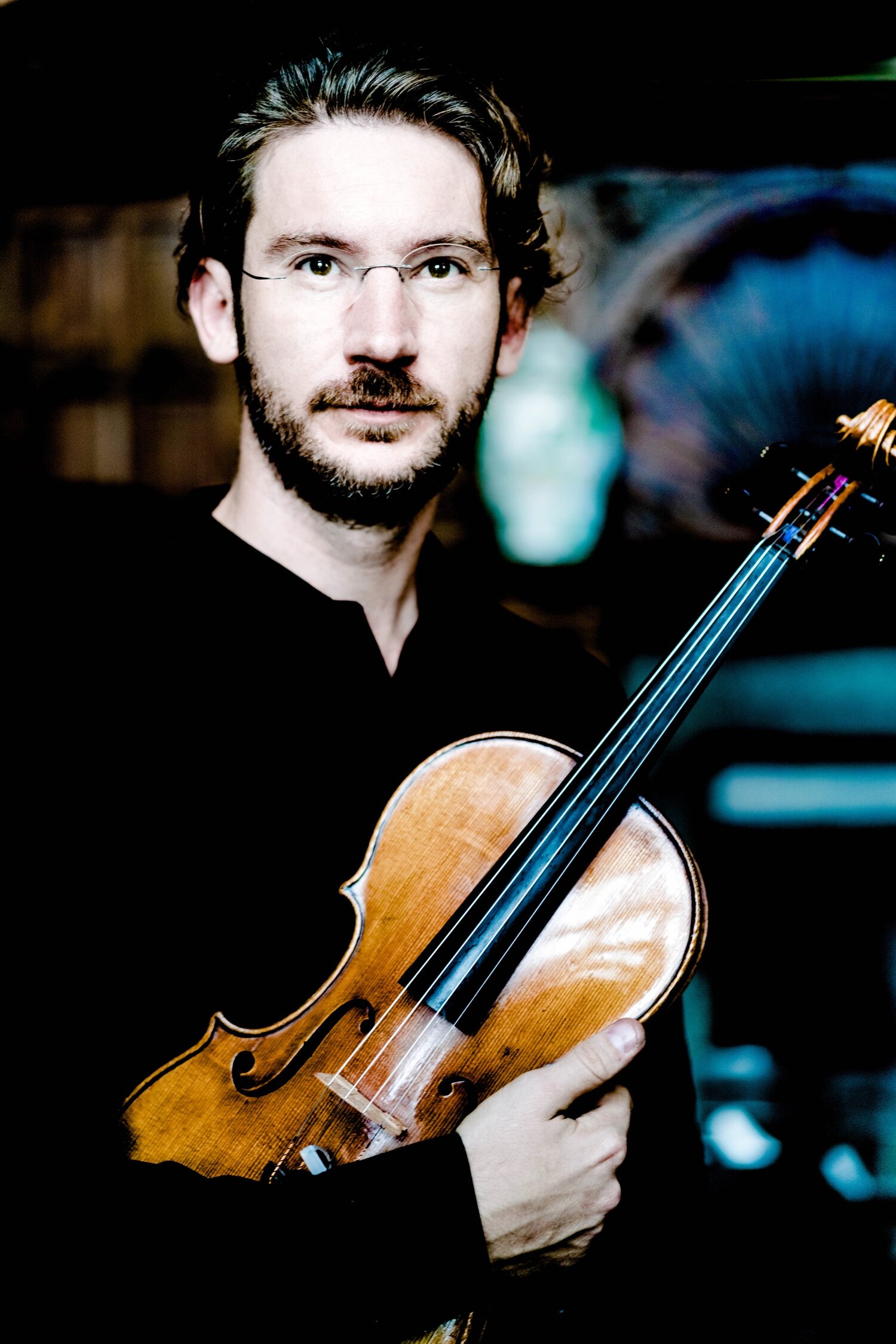 Sascha Bota, viola
Sascha Bota, viola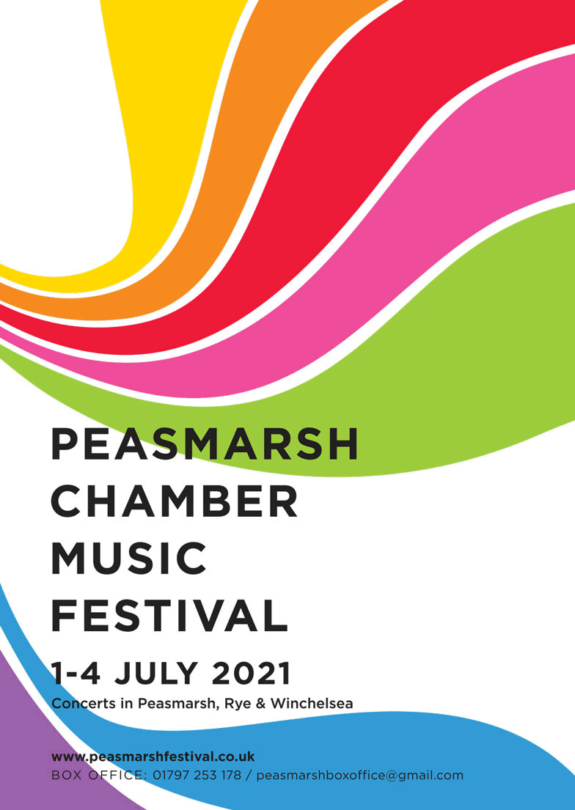 2021 Programme
2021 Programme